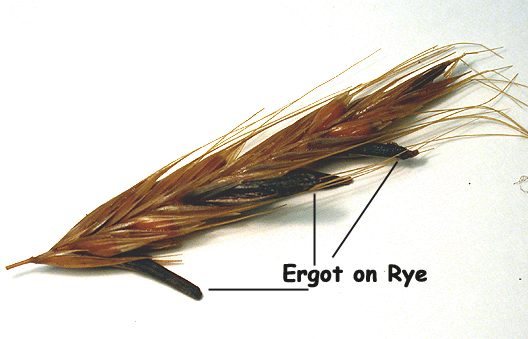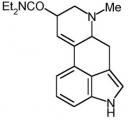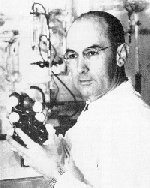Ergot to LSD | Discovery| Chemical Structure | How It Works | LSD’s Affect on History | History’s Affect on LSD | References
Baker, R. W., Chothia, C., Pauling, P., & Weber, H. P. (1972 November 10). Molecular Structure of LSD. Science, New Series, 178, 614- 615.
Barron, F. (1967). Motivational Patterns in LSD Usage. In Richard C. DeBold (Ed.) & Russell C. Leaf (Ed.), LSD Man & Society. (pp. 3-19). Middletown, Connecticut: Wesleyan University Press.
Cohen, S. (1968). The Beyond Within: The LSD Story. Kingsport, Tennessee: Kingsport
Press.
Couteur, P. L. & Burreson, J. (2004). Napoleon’s Buttons: 17 Molecules That Changed
History. New York: Penguin Group Inc.
Dyck, E. (2005, January). Flashback: Psychiatric Experimentation With LSD in
Historical Perspective. Canadian Journal of Psychiatry. 50(7), 381-389.
Retrieved April 1, 2008, from ProQuest.
Dyck, E. (2007 Fall). Land of the Living Sky with Diamonds: A Place for Radical
Psychiatry? Journal of Canadian Studies. 41(3), 42-68. Retrieved April 1, 2008,
from ProQuest.
Hofmann, A. (1980). LSD- My Problem Child. McGraw- Hill. Found in The Psychedelic
Library. http://www.psychedelic-library.org/child.htm.
Kamen, A. (1987 June 26). Court rules out lawsuit on Army LSD experiment. St.
Petersburg Times. 1.A., Retrieved May 6, 2008, from ProQuest.
Kurland, A. A. (1967). The Therapeutic Potential of LSD in Medicine. In Richard C.
DeBold (Ed.) and Russell C. Leaf (Ed.), LSD Man & Society. (pp. 20-35).
Middletown, Connecticut: Wesleyan University Press.
Leary, T. (1964). Introduction. In David Solomon. (Ed.), LSD- The Consciousness-
Expanding Drug. (pp. 1-21). New York: G.P. Putnam’s Sons.
Levine, C. (1989 July- August). Are There Ethical Exceptions? IRB: Ethics and Human
Research, 11, 5-7. Retrieved May 7, 2008, from JSTOR.
London, P. (1979 December). The Moral Dilemma of Military Psychology [Review of
the book War on the Mind: The Military Uses and Abuses of Psychology]. The
Hastings Center Report, 9, 42-44. Retrieved May 7, 2008, from JSTOR.
Nichols, D. E. (2004). Hallucinogens. Pharmacology & Therapeutics. 131-181. Retrieved
May 7, 2008.
http://www.erowid.org/references/refs_view.php?A=ShowDoc1&ID=6318.
Novak, S. J. (1997 March). LSD before Leary: Sidney Cohen’s Critique of 1950s
Psychedelic Drug Research. Isis. 88, 87- 110. Retrieved May 3, 2008, from
JSTOR.
Savage, D. A. (1987 June 26). High Court Bars Military From Suing U.S. Los Angeles Times. 16. Retrieved May 6, 2008, from ProQuest.
Thomas, C. W., Petersen, D. M., & Zingraff, M. T. (1975 March). Student Drug Use: A
Re-Examination of the “Hang-Loose Ethic” Hypothesis. Journal of Health and
Social Behavior, 16, 63-73. Retrieved May 6, 2008, from JSTOR.
Wakefield, D. (1963). The Hallucinogens: A Reporter’s Objective View. In David
Solomon. (Ed.), LSD- The Consciousness- Expanding Drug. (pp. 40-63 ). New
York: G.P. Putnam’s Sons.
[Read more →]
Ergot to LSD | Discovery| Chemical Structure | How It Works | LSD’s Affect on History | History’s Affect on LSD | References

LSD brought about a significant amount of psychological research in the 1950s and 1960s. One particular area of Scientific research included the fundamental hypothesized that experimenting with LSD could have been able to help us understand permanent psychosis, as using LSD often produces feelings of psychosis.
It is also undeniable that LSD created and heavily influenced the environment of the 1960s in America. It was the drug of the youth and the rebellious. Many famous icons including the Beatles and Timothy Leary took LSD for creative and religious inspiration.
LSD’s association with Student Riot groups and other youth groups fighting to end the Vietnam War ultimately led to a nation wide “war on drugs.” Drug policy was created and enforced, with LSD at the top of the list of Schedule 1 drugs.
[Read more →]
Ergot to LSD | Discovery| Chemical Structure | How It Works | LSD’s Affect on History | History’s Affect on LSD | References
Although LSD itself is synthetic, understanding basic knowledge of ergot, LSD’s primary derivative, is helpful to appreciate the circumstances under which LSD was created. Ergot, a naturally occurring fungus, grows upon rye and is recognized for its medical value. Historically, ergot has been the cause of mass poisonings across cultures (ergotism), and was also a probable cause of the Salem witch trials, as mentioned in Napoleon’s Buttons. Beginning in the late sixteenth century, the first recorded medical use of ergot was as a drug to help with childbirth. Unfortunately, this use was ultimately unable to be sustained, as it too often lead to uterine spasms and other dangers to the child, which are characteristics that ergot commonly shares with LSD. As a result, it wasn’t until 1930s that this research was fully re-established, leading to the discovery of lysergic acid as the shared component of all ergot alkaloids.

[Read more →]







